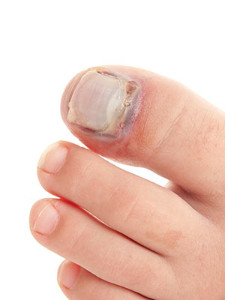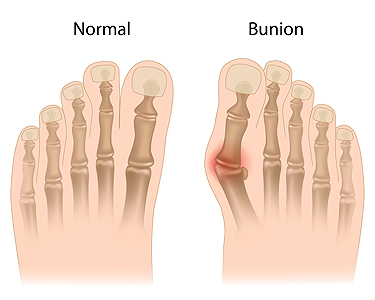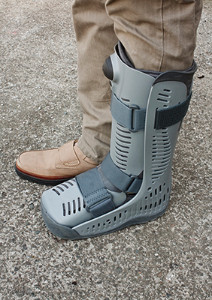Connect With Us
Blog
How to Care for a Broken Toe
 If you have incurred an injury to your toe or have dropped a heavy object on it, you may have a broken toe. Common symptoms that typically accompany this condition may include pain and discomfort, swelling, redness, or tenderness. Walking may prove to be a difficult task to accomplish, and the toe may often appear bruised. For severely broken toes, the affected bone may protrude from the skin, or the toe may appear to be at an unnatural angle. Once a proper diagnosis is performed, which is often accomplished by having an X-ray taken, proper treatment techniques can begin. These may include elevating the foot, which may reduce any pain or swelling, taping the affected toe to the toe next to it for support, or wearing appropriate footwear that that can accommodate the broken toe. If you feel you have broken your toe, it’s suggested to speak with a podiatrist as quickly as possible.
If you have incurred an injury to your toe or have dropped a heavy object on it, you may have a broken toe. Common symptoms that typically accompany this condition may include pain and discomfort, swelling, redness, or tenderness. Walking may prove to be a difficult task to accomplish, and the toe may often appear bruised. For severely broken toes, the affected bone may protrude from the skin, or the toe may appear to be at an unnatural angle. Once a proper diagnosis is performed, which is often accomplished by having an X-ray taken, proper treatment techniques can begin. These may include elevating the foot, which may reduce any pain or swelling, taping the affected toe to the toe next to it for support, or wearing appropriate footwear that that can accommodate the broken toe. If you feel you have broken your toe, it’s suggested to speak with a podiatrist as quickly as possible.
Broken toes may cause a lot of pain and should be treated as soon as possible. If you have any concerns about your feet, contact one of our podiatrists from Foot & Ankle Associates of Maine. Our doctors will treat your foot and ankle needs.
What Is a Broken Toe?
A broken toe occurs when one or more of the toe bones of the foot are broken after an injury. Injuries such as stubbing your toe or dropping a heavy object on it may cause a toe fracture.
Symptoms of a Broken Toe
- Swelling
- Pain (with/without wearing shoes)
- Stiffness
- Nail Injury
Although the injured toe should be monitored daily, it is especially important to have a podiatrist look at your toe if you have severe symptoms. Some of these symptoms include worsening or new pain that is not relieved with medication, sores, redness, or open wounds near the toe.
If you have any questions, please feel free to contact our office located in Brunswick, ME . We offer the newest diagnostic and treatment technologies for all your foot care needs.
What Causes An Ingrown Toenail?
 If you are experiencing pain and swelling surrounding the nail on the big toe, you may have what is known as an ingrown toenail. Research has shown that when this condition is treated promptly and correctly, many unpleasant and uncomfortable foot conditions may be avoided. These may include a painful infection developing, as well as partial or total removal of the toenail. There are several causes of why this ailment may occur, including improperly cut toenails, wearing shoes and socks that may be too tight, or possible injuries to the toe. Additionally, genetics may play a role in determining the shape of the toenail, which may press more easily into the side of the toenail. Painful symptoms may include bleeding or discharge from the surrounding area of the toenail, severe redness, or swelling. It’s advised to consult with a podiatrist as quickly as possible so the correct treatment options may be discussed.
If you are experiencing pain and swelling surrounding the nail on the big toe, you may have what is known as an ingrown toenail. Research has shown that when this condition is treated promptly and correctly, many unpleasant and uncomfortable foot conditions may be avoided. These may include a painful infection developing, as well as partial or total removal of the toenail. There are several causes of why this ailment may occur, including improperly cut toenails, wearing shoes and socks that may be too tight, or possible injuries to the toe. Additionally, genetics may play a role in determining the shape of the toenail, which may press more easily into the side of the toenail. Painful symptoms may include bleeding or discharge from the surrounding area of the toenail, severe redness, or swelling. It’s advised to consult with a podiatrist as quickly as possible so the correct treatment options may be discussed.
Ingrown toenails can become painful if they are not treated properly. For more information about ingrown toenails, contact one of our podiatrists of Foot & Ankle Associates of Maine. Our doctors can provide the care you need to keep you pain-free and on your feet.
Ingrown Toenails
Ingrown toenails occur when a toenail grows sideways into the bed of the nail, causing pain, swelling, and possibly infection.
Causes
- Bacterial infections
- Improper nail cutting such as cutting it too short or not straight across
- Trauma to the toe, such as stubbing, which causes the nail to grow back irregularly
- Ill-fitting shoes that bunch the toes too close together
- Genetic predisposition
Prevention
Because ingrown toenails are not something found outside of shoe-wearing cultures, going barefoot as often as possible will decrease the likeliness of developing ingrown toenails. Wearing proper fitting shoes and using proper cutting techniques will also help decrease your risk of developing ingrown toenails.
Treatment
Ingrown toenails are a very treatable foot condition. In minor cases, soaking the affected area in salt or antibacterial soaps will not only help with the ingrown nail itself, but also help prevent any infections from occurring. In more severe cases, surgery is an option. In either case, speaking to your podiatrist about this condition will help you get a better understanding of specific treatment options that are right for you.
If you have any questions please feel free to contact our office located in Brunswick, ME . We offer the newest diagnostic and treatment technologies for all your foot and ankle needs.
Treatment Options For Bunion
 The medical condition known as hallux valgus is commonly referred to as a bunion. It typically occurs as a result of a misalignment in the joint of the big toe, and may cause pain and discomfort. It appears as a large bony protrusion on the side of the big toe and may be difficult to wear specific shoes. If you have a bunion, you most likely may notice tenderness and swelling around the affected joint, in addition to possible joint pain arising from the development of arthritis. This may develop at a faster rate if the bunion is not treated promptly. Some of the reasons why bunions could form may include having an abnormal foot structure such as flat feet, an inherited genetic trait, or extremely flexible ligaments and tendons. Research has shown there are different treatment techniques, which may provide moderate relief. This includes wearing shoes that fit correctly, performing gentle exercises, or wearing insoles in the shoes. It’s important to consult with a podiatrist who can determine the best treatment option for you.
The medical condition known as hallux valgus is commonly referred to as a bunion. It typically occurs as a result of a misalignment in the joint of the big toe, and may cause pain and discomfort. It appears as a large bony protrusion on the side of the big toe and may be difficult to wear specific shoes. If you have a bunion, you most likely may notice tenderness and swelling around the affected joint, in addition to possible joint pain arising from the development of arthritis. This may develop at a faster rate if the bunion is not treated promptly. Some of the reasons why bunions could form may include having an abnormal foot structure such as flat feet, an inherited genetic trait, or extremely flexible ligaments and tendons. Research has shown there are different treatment techniques, which may provide moderate relief. This includes wearing shoes that fit correctly, performing gentle exercises, or wearing insoles in the shoes. It’s important to consult with a podiatrist who can determine the best treatment option for you.
If you are suffering from bunions, contact one of our podiatrists of Foot & Ankle Associates of Maine. Our doctors can provide the care you need to keep you pain-free and on your feet.
What Is a Bunion?
A bunion is formed of swollen tissue or an enlargement of boney growth, usually located at the base joint of the toe that connects to the foot. The swelling occurs due to the bones in the big toe shifting inward, which impacts the other toes of the foot. This causes the area around the base of the big toe to become inflamed and painful.
Why Do Bunions Form?
Genetics – Susceptibility to bunions are often hereditary
Stress on the feet – Poorly fitted and uncomfortable footwear that places stress on feet, such as heels, can worsen existing bunions
How Are Bunions Diagnosed?
Doctors often perform two tests – blood tests and x-rays – when trying to diagnose bunions, especially in the early stages of development. Blood tests help determine if the foot pain is being caused by something else, such as arthritis, while x-rays provide a clear picture of your bone structure to your doctor.
How Are Bunions Treated?
- Refrain from wearing heels or similar shoes that cause discomfort
- Select wider shoes that can provide more comfort and reduce pain
- Anti-inflammatory and pain management drugs
- Orthotics or foot inserts
- Surgery
If you have any questions, please feel free to contact our office located in Brunswick, ME . We offer the newest diagnostic and treatment technologies for all your foot care needs.
Possible Treatments of a Broken Ankle
 Research has shown the ankle is comprised of three bones that interlock together. If an injury is endured that fractures one or more of these bones, it is often referred to as a broken ankle. There are several ligaments and tendons that are attached to these specific bones and may become displaced if the ankle becomes fractured. This typically may occur if a fall has happened and the ankle twists unnaturally. The noticeable symptoms may often include severe pain in and around the affected ankle, unsightly bruising, or difficulty in moving the toes. There are several ways to treat this condition, including wearing a protective boot, taping or wrapping the ankle, which may provide additional support, or possible surgery, which is often determined by the severity of the fracture. If you have broken your ankle, it’s advised to speak with a podiatrist as quickly as possible so the correct choice of treatment can begin.
Research has shown the ankle is comprised of three bones that interlock together. If an injury is endured that fractures one or more of these bones, it is often referred to as a broken ankle. There are several ligaments and tendons that are attached to these specific bones and may become displaced if the ankle becomes fractured. This typically may occur if a fall has happened and the ankle twists unnaturally. The noticeable symptoms may often include severe pain in and around the affected ankle, unsightly bruising, or difficulty in moving the toes. There are several ways to treat this condition, including wearing a protective boot, taping or wrapping the ankle, which may provide additional support, or possible surgery, which is often determined by the severity of the fracture. If you have broken your ankle, it’s advised to speak with a podiatrist as quickly as possible so the correct choice of treatment can begin.
Broken ankles need immediate treatment. If you are seeking treatment, contact one of our podiatrists from Foot & Ankle Associates of Maine. Our doctors can provide the care you need to keep you pain-free and on your feet.
Broken Ankles
A broken ankle is experienced when a person fractures their tibia or fibula in the lower leg and ankle area. Both of these bones are attached at the bottom of the leg and combine to form what we know to be our ankle.
When a physician is referring to a break of the ankle, he or she is usually referring to a break in the area where the tibia and fibula are joined to create our ankle joint. Ankles are more prone to fractures because the ankle is an area that suffers a lot of pressure and stress. There are some obvious signs when a person experiences a fractured ankle, and the following symptoms may be present.
Symptoms of a Fractured Ankle
- Excessive pain when the area is touched or when any pressure is placed on the ankle
- Swelling around the area
- Bruising of the area
- Area appears to be deformed
If you suspect an ankle fracture, it is recommended to seek treatment as soon as possible. The sooner you have your podiatrist diagnose the fracture, the quicker you’ll be on the way towards recovery.
If you have any questions, please feel free to contact our office located in Brunswick, ME . We offer the newest diagnostic and treatment technologies for all your foot care needs.
